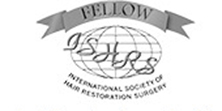How To Grasp A Hair Follicle: Avoiding Kinky Hair Growth
What the consumer oftentimes fails to understand is that a well-trained and dedicated hair transplant assistant is a vital component to achieving excellent cosmetic outcomes in a hair-transplant procedure. Many times a consumer looks at the reputation of the surgeon or a brand name outfit for reasons to select that entity to do the hair transplant work for him or her. However, an untrained or undedicated team can lead to poor outcomes no matter how good the surgeon is. This article will focus on one element alone in understanding quality control in hair restoration: how to avoid kinky hair growth.
When the hair-transplant assistant touches or grasps the graft along the hair follicle, the risk is that the hair shaft can grow out kinky and unnatural. This is why it is so important that every assistant be highly aware of what he or she is doing so that this complication does not arise. In short, it is a “no-touch” policy that must be enforced to ensure consistently excellent graft growth and graft results. When the hair shaft or bulb is even gently compressed during graft manipulation and graft insertion, the outcome can be devastatingly poor. When I hired two staff members from a major hair-transplant chain a couple of years ago they really had very little inkling as to this level of quality control. Perhaps that explains why I have had to fix so many bad transplant results coming from that chain. Quality control as demonstrated by the hair-transplant assistant is of paramount importance when working for consistently excellent hair-transplant results.
Samuel M. Lam, MD, FACS, a board certified hair transplant surgeon in Dallas, Texas. To learn more about Dr Lam’s hair transplant procedures, or to schedule a consultation please call 972-312-8105, or visit hairtx.com for more info. To ask Dr Lam a question please visit our hair transplant forum.




